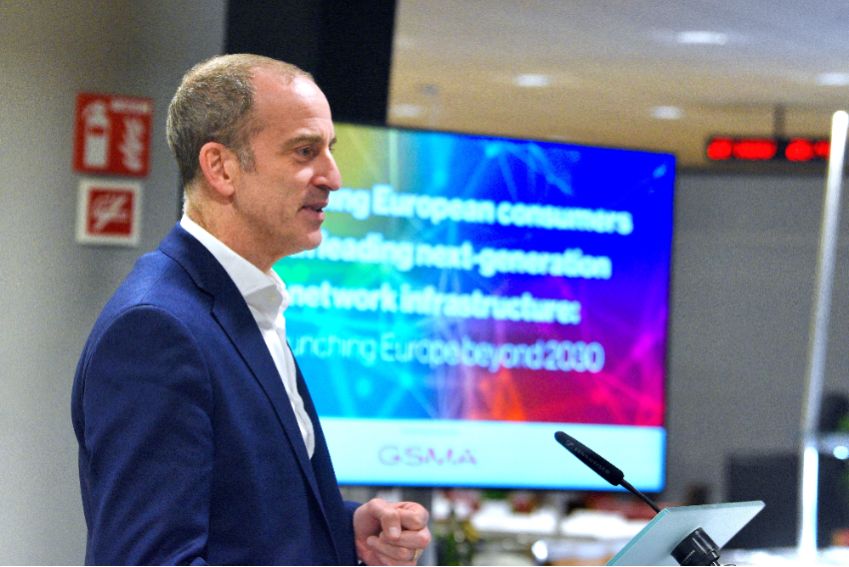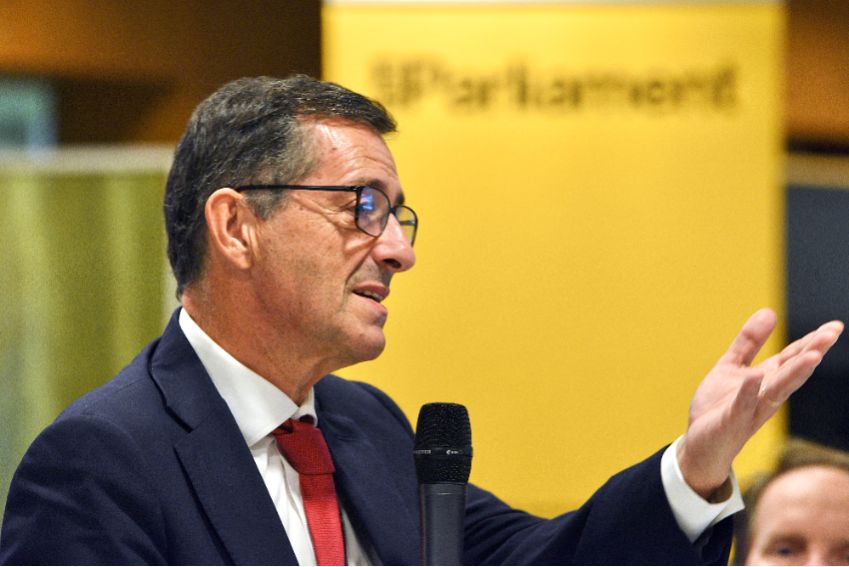“Europe is far from reaching Digital Decade connectivity targets and is now painfully behind other advanced regions in digital connectivity and digital offerings for businesses and consumers”. This stark warning on the state of Europe’s 5G rollout came from Kalvin Bahia, Principal Economist at GSMA Intelligence, at a recent dinner discussion hosted by The Parliament.
Whilst Europe was once a connectivity powerhouse, recent developments in network technology have left Europe straggling behind other areas of the world. “The ecosystem of connectivity was European, we led the way” Ben Wreschner, Chief Economist of Vodafone Group reminded the room. Following the founding of 3G, the majority of its early usage was in Europe. But as subsequent generations of mobile technology have been introduced, this percentage has seen a rapid drop-off: just 11% of the first 500 million users of 4G technologies came from the EU, and the launch of 5G has told a similar story. Only 4% of the first 500 million users of 5G came from the EU, whereas 71% came from China. When scaling this figure up to the first 100 billion users, the EU’s tale is equally as torrid with just 6% of users of the technology coming from the region. These figures leave a lot to be desired.
 MEP Karen Melchior (Renew Europe, Denmark)
MEP Karen Melchior (Renew Europe, Denmark)
Hope for Europe’s digital decade target of full 5G coverage throughout Europe by 2030 looks equally as bleak. The European Commission’s recently published State Of The Digital Decade report found that 65% of populated rural areas are not currently covered by 5G. This poses fundamental problems for Europe. Whilst 4G was a technology which drove audience consumption habits and the popularisation of the app economy, 5G is vitally important for critical infrastructure and European industry. The connected nature of modern technology means that applications as varied as traffic lights and medical technologies will increasingly rely on 5G connectivity to function. Without this technology, Europe’s industry faces falling behind on all levels. Businesses of all sizes from SMEs to corporates risk being left behind.
A qualified labour force seems to be one of the biggest challenges everywhere in European policy. We need to invest in this as we need more specialists and experts.
MEP Tsvetelina Penkova, (EPP, Bulgaria)
5G’s slow rollout in Europe also raises questions around competition. Due to a lack of innovation capacity, the majority of 5G’s critical technology in Europe is coming from companies outside the region. Europe once boasted of industry-leading mobile device brands like Nokia and Ericsson upon the founding of mobile networks. Their devices and infrastructure enabled Europe to lead the way in mobile technology uptake across the world. However, 5G’s rollout has seen this dominance fade and other areas of the world come to the forefront of technological innovation.
This has already added a reliance of Europe on foreign actors. Falling behind in 5G risks increasing this reliance further. As a strong network of 27 countries, the European Union is a power hub of innovation and should be leading, not chasing competitors across the globe. Strong actions around competition have already been undertaken by the European Commission, and network technology is a natural next area of focus to help Europe reinforce its place as a global innovation powerhouse.
 Ben Wreschner, Chief Economist of Vodafone Group
Ben Wreschner, Chief Economist of Vodafone Group
As with so many issues facing Europe a lack of investment capacity is holding industry back, but finding money is a difficult issue. “We need to be creative with how we seek investment,” underlined MEP Zorrinho during the dinner. Whilst doing this however, Europe has to be sure not to sacrifice more of its strategic autonomy. MEP Karen Melchior issued a warning about the current state of funding in the telecommunications industry. “I find it quite worrying when looking at the investment in telecommunications from foreign actors and equity funds” Melchior argued. This investment is something which has long been sought after, however services for consumers have not improved. With further investment, she added that telecommunications companies have a duty to provide quality services to help Europe catch up.
Policy was cited as a key driver for turning this technological tide so that Europeans can reap the benefit of 5G technology. “We need policies and regulations that encourage innovation and invest in fair competition,” host MEP Penkova explained. Looking ahead, Penkova added that with upcoming legislation, the European Parliament will “aim to benefit both citizens and businesses to ensure Europe remains at the forefront of digital innovation”.
The need for greater education and skills was also highlighted as an area for improvement. The specialist nature of mobile technologies is a challenge which Europe needs to address according to MEP Penkova. “A qualified labour force seems to be one of the biggest challenges everywhere in European policy. We need to invest in this as we need more specialists and experts,” she argued, adding that Europe’s skills agenda offers promise in this area, but acceleration is needed if it is to react quickly to the 5G fallout.
 MEP Carlos Zorrinho (S&D, Portugal)
MEP Carlos Zorrinho (S&D, Portugal)
A fundamental reset of regulation surrounding mobile network technology was widely seen to be important to the path towards achieving a better connected Europe. Europe’s failure in both 4G and 5G technologies are pertinent reminders that existing policy is not fit for purpose and needs significant change.
Steps in the right direction have already been taken. The European Commission will soon launch a White Paper with potential for a Digital Networks Act that might address the investment gap in the European telecoms sector, and make European telecoms competitive on the world stage. Hopes were shared throughout the discussion that the European Parliament would act quick in responding to this critical issue for Europe’s short and long term future.
The race isn’t over, but the clock is ticking.
Ben Wreschner, Chief Economist of Vodafone Group
Despite the negative forecasts around 5G adoption in Europe, hope was not lost amongst attendees. “The race isn’t over, but the clock is ticking” Ben Wreschner concluded, but “if we don’t change now we’ll lose the race and we will rely on non-European actors”. With the GSMA’s latest research reporting that mobile data traffic in Europe is set to almost triple over the next five years - fuelled by 4G migration in central and eastern Europe and increasing improvements in 5G coverage and capacity - Europe’s connectivity challenge is a key topic for the future. To regain its lost ground in the mobile network transitions, Europe and its policymakers must act before it is too late.
Read GSMA’s latest European Mobile Economy Report.
In partnership with

This article was produced in partnership with GSMA.
Sign up to The Parliament's weekly newsletter
Every Friday our editorial team goes behind the headlines to offer insight and analysis on the key stories driving the EU agenda. Subscribe for free here.